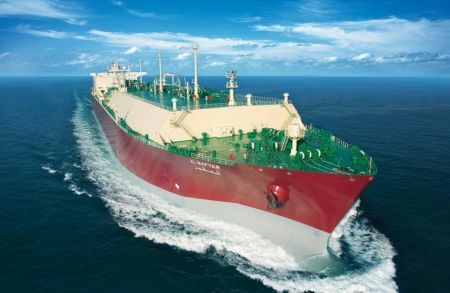
The Fos Cavaou LNG terminal, yesterday received the Al Mafyar Q-Max tanker – the very first of its kind in France. The vessel belongs to the Q-max class: the largest existing tankers for transporting Liquefied Natural Gas (LNG), with a total fleet of 14 worldwide. This giant of the seas is 345 metres long and 54 metres wide, and can carry up to 266,000 cubic metres of LNG – equivalent to the usage of a city such as Lyon (530,000 inhabitants) in a year.
The access to the Fos Cavaou terminal to receive Q-Max ships involved close cooperation between the company Fosmax LNG, the services of the port of Marseille Fos – especially the Harbour Master’s Office – and the port services, in particular the docking pilots. In their premises, the pilots carried out simulations for vessel approach and berthing in order to be able to receive the Al Mafyar in the safest possible conditions.
Located at the entrance of the port of Fos-sur-Mer, the Fos Cavaou LNG terminal is designed to receive all kinds of vessels. It enjoys both a strategic location on the Mediterranean and an optimal nautical situation (low-amplitude tide and out of the way of port traffic, which is a safety factor when manoeuvring ships). Thanks to its location, it can receive imports both from sources of supply that are nearby – such as North Africa – and further away – such as the Middle East, West Africa, which are major areas of LNG production. Since it became operational in 2010, the terminal has received more than 180 vessels, a quarter of which were “Q-Flex” (210 000 m3), latest-generation ships similarly to the “Q-Max”.
Fos Cavaou is one of Europe’s most dynamic LNG terminals, with a rate of use of over 50% (while the average rate of use of European terminals is about 30%), which amounts to an average of 5 vessels per month. Its capacity is sold by the company Fosmax LNG, which strives to offer increased flexibility by proposing new services each year, including reloading services (4 reloading operations since late 2012).
We use cookies to improve your experience. By continuing to use our site, you accept our Cookies, Privacy Policy,Terms and Conditions. Close X